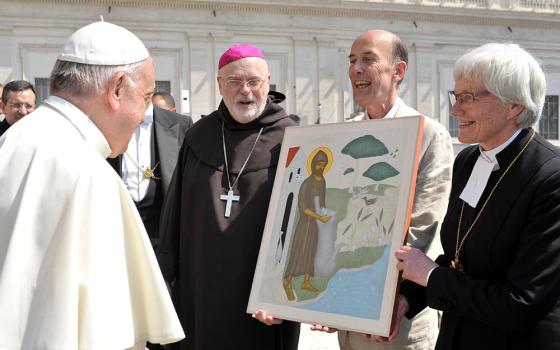Catholic Relief Services and a host of other nonprofit agencies that distribute food aid overseas were successful in getting lawmakers to purge a provision in a bill that could have cut the amount of food aid they would be able to distribute in the future.
The provision would have increased from 50 percent to 75 percent the amount of food aid that must be transported on privately owned, U.S.-flagged ships. In 2012, Congress had lowered the requirement from 75 percent to 50 percent.
The Senate approved a two-year Coast Guard funding reauthorization bill Wednesday after striking the provision. The House, which had passed a version of the legislation in April containing the increase to 75 percent, must now reconsider the bill before the lame-duck congressional session ends as expected in mid-December.
The issue is important to CRS, the U.S. church's international relief and development agency, and others, because shipping goods on U.S. ships cost about 2.7 times as much as shipping them on foreign-flagged vessels, according to the U.S. Department of Transportation.
CRS and other aid groups have contracts with the federal government for fixed dollar figures on sending food aid to countries in need, said Eric Garduno, CRS' senior legislative specialist in Washington.
From that contract, all expenses must be paid, including the cost of shipping the food, Garduno said.
The House version also gives the federal secretary of transportation the right to impose cargo preferences "without the consultation of agencies or departments whose rules your agency will impact," Garduno told Catholic News Service in an interview Monday. The U.S. Department of Agriculture and the U.S. Agency for International Development are the other two federal agencies that manage and implement international food aid programs.
In a joint statement, more than 30 nonprofits banded together to argue against raising the U.S.-flag requirement.
"In April, the Department of Homeland Security warned that increasing cargo preference from 50 percent to 75 percent, as proposed under Sec. 318 [of the House bill], would increase transportation costs for U.S. international food aid programs by $75 million annually, and result in at least 2 million vulnerable people losing access to life-saving food aid from the United States," the statement said.
"Given the number of current food security emergencies and others on the horizon, we cannot afford to make U.S. food aid more costly," it added. "With 805 million people around the world going hungry every day, we must make every food aid dollar count. It is both a responsible use of taxpayer money and a moral imperative. We should allocate more of our resources to feed the poor and most vulnerable, not less."
Joining CRS in signing the statement were the Maryknoll Office for Global Concerns, Mercy Corps, Oxfam America, CARE, Bread for the World, Church World Service, Africare, Lutheran World Relief, The Presbyterian Church U.S.A., the United Methodist General Board of Church and Society, Save the Children and American Jewish World Service.
Simply put, CRS's Garduno told CNS, "the more transportation costs, the less money we have to buy food. It's U.S. food that's being bought and shipped over."




